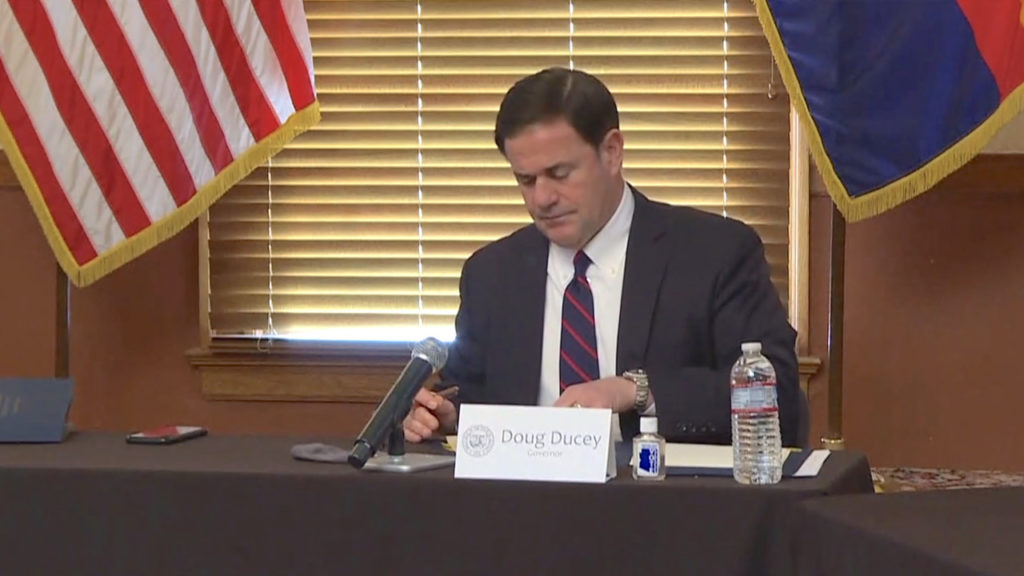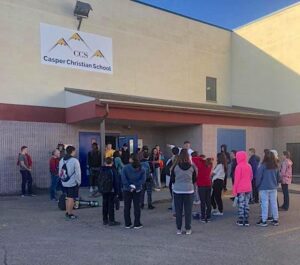A new educational frontier opens wide with coming of Arizona’s universal school choice law. What’s it mean for Christian educators?
Arizona may soon be the site of the Oklahoma Land Rush of school choice, as a new law allows all parents in the state to take their kids’ share of state education dollars to the schools – and…

Arizona may soon be the site of the Oklahoma Land Rush of school choice, as a new law allows all parents in the state to take their kids’ share of state education dollars to the schools – and even homeschools – of their choice.
Are Christian schools, already booming in the face of wide dissatisfaction with public education, going to be prepared for the coming land rush of new students?
“There are some that are going to be ready. There are others where the infrastructure might not all be in place if there’s a massive population shift,” says an excited Jeff Blake, superintendent of Phoenix Christian Preparatory School in the heart of the city.
The oldest Christian school in the state, having migrated there from Kansas in 1912 during the early days of Arizona statehood, Phoenix Christian was visited by the governor during the battle for universal school choice. And on Tuesday, Gov. Doug Ducey returns to the school for a ceremonial signing of the landmark HB-2853 (already officially signed into law last month) that expands the state’s existing Empowerment Scholarship Account (ESA) school choice program to every family in the state.
The original ESA program only covered children of military members, foster kids, children with disabilities and students on Native American reservations. The law’s expansion offers $7,000 to all students to use as their parents see fit.
Educationally, Arizona might now be as wide open a frontier as it was in 1912.
Interestingly, it’s the smaller Christian schools that may have more room for an influx of students.
“Scottsdale Christian has a waiting list for almost every single grade level. Northwest Christian, there’s a waiting list for almost every single grade level,” Blake tells The Lion.
“Many of the larger Christian schools are nearing capacity [including Phoenix Christian]. What’s honestly exciting is, I think for some of the rural Christian schools, their tuition is going to be right within that $7,000 ESA-dollar-mark. I think that’s going to be a massive growth opportunity for some of my rural sister schools, which I’m really excited about.”
And it sets up fertile ground for Christian school startups, especially in underserved and wholly unserved areas of the state.
“If this helps ease that burden and hire and attract really gifted educators willing to move out and beyond and serve in those schools, I’m excited for that,” Blake says.
It’s all a win-win situation, according to Blake, since Christian schools can save the state money with business-like efficiencies – and since the state would be hard-pressed to take on all the students Christian schools are currently educating.
Despite all this, there is heavy pressure to block or overturn the school choice law. Anti-school choice group Save Our Schools has declared its intent to gather the required 119,000 signatures by Sept. 25 to force the law onto a public referendum in 2024. Opponents managed to do that to an earlier expansion of school choice in 2018.
What voters may not understand – and what Gov. Ducey is trying to communicate by his visits to Phoenix Christian – is how racially and economically diverse private and Christian education has become.
At Phoenix Christian, for instance, some 80% of students are funded in part by tax credit dollars voluntarily funneled to School Tuition Organizations, and the majority of kids qualify for free and reduced-price lunches.
“We serve a very, very high percentage of lower income families,” Blake says.
He adds that Phoenix Christian is proud to serve a racially diverse student body “of no majority.” In fact, diversity is one of the school’s “five-fold missional commitments,” which also include introducing students to Jesus; growing their relationship with Him; being missional in the community and world; and opening up other educational and vocational futures.
“Many students may come here having never read Matthew, Mark, Luke or John, or parts of the Bible,” Blake says. “But they’re going to watch and observe the living curriculum of our faculty and staff, and our parents know that. And even families that maybe don’t have a faith background or a similar faith tradition, they’ll enroll their children here knowing that this is an environment where the kids are individually cared for and loved.”
Another argument opponents trot out against school choice is the need for services for disabled students. But Blake says Phoenix Christian has leveraged the earlier ESA program as well as tax credits to serve a large population of autistic students and those with other learning disabilities.
It just happens to be in “a Christ-centered school giving parents educational freedom, opening doors of opportunity that these families might not otherwise have.”
Arguments that stress the economic vitality of public schools are misguided and beside the point, Blake says. For one thing, the money is merely following the student – and the public district where he lives is sending out student recruitment mailings just like Phoenix Christian, a reflection of the newly competitive education environment there.
“That’s sort of capitalism at work. That’s enterprise. That’s competition. And that’s good, ’cause we’re all wanting to be better,” he says. “I’m not against public school at all. But we should all strive to be better and listen to what the market’s wanting, and providing exceptional education for kids and what parents are looking for.”
Ultimately, Blake argues, this debate should be about students, not schools.
“It’s about the students more than the school, I have to be honest – and what’s best for the students.”



